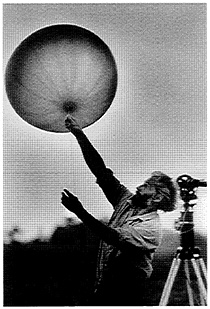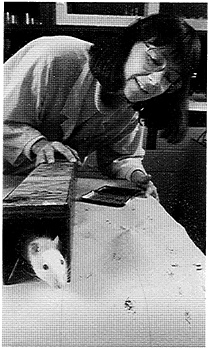INTRODUCTION
The geneticist Barbara McClintock once said of her research, "I was just so interested in what I was doing I could hardly wait to get up in the morning and get at it. One of my friends, a geneticist, said I was a child, because only children can't wait to get up in the morning to get at what they want to do."
Anyone who has experienced the childlike wonder evoked by observing or understanding something that no one has ever observed or understood before will recognize McClintock's enthusiasm. The pursuit of that experience is one of the forces that keep researchers rooted to their laboratory benches, climbing through the undergrowth of a sweltering jungle, or following the threads of a difficult theoretical problem. To succeed in research is a personal triumph that earns and deserves individual recognition. But it is also a communal achievement, for in learning something new the discoverer both draws on and contributes to the body of knowledge held in common by all scientists.

Scientific research offers many other satisfactions in addition to the exhilaration of discovery. Researchers have the opportunity to associate with colleagues who have made important contributions to human knowledge, with peers who think deeply and care passionately about subjects of common interest, and with students who can be counted on to challenge assumptions. With many important developments occurring in areas where disciplines overlap, scientists have many opportunities to work with different people, explore new fields, and broaden their expertise. Researchers often have considerable freedom both in choosing what to investigate and in deciding how to organize their professional and personal lives. They are part of a community based on ideals of trust and freedom, where hard work and achievement are recognized as deserving the highest rewards. And their work can have a direct and immediate impact on society, which ensures that the public will have an interest in the findings and implications of research.
Research can entail frustrations and disappointments as well as satisfactions. An experiment may fail because of poor design, technical complications, or the sheer intractability of nature. A favored hypothesis may turn out to be incorrect after consuming months of effort. Colleagues may disagree over the validity of experimental data, the interpretation of results, or credit for work done. Difficulties such as these are virtually impossible to avoid in science. They can strain the composure of the beginning and senior scientist alike. Yet struggling with them can also be a spur to important progress.
Scientific progress and changes in the relationship between science and society
are creating new challenges for the scientific community. The numbers of trained researchers and exciting research opportunities have grown faster than have available financial resources, which has increased the pressure on the research system and on individual scientists. Research endeavors are becoming larger, more complex, and more expensive, creating new kinds of situations and relationships among researchers. The conduct of research is more closely monitored and regulated than it was in the past. The part played by science in society has become more prominent and more complex, with consequences that are both invigorating and stressful.
To nonscientists, the rich interplay of competition, elation, frustration, and cooperation at the frontiers of scientific research seems paradoxical. Science results in knowledge that is often presented as being fixed and universal. Yet scientific knowledge obviously emerges from a process that is intensely human, a process indelibly shaped by human virtues, values, and limitations and by societal contexts. How is the limited, sometimes fallible, work of individual scientists converted into the enduring edifice of scientific knowledge?
The answer lies partly in the relationship between human knowledge and the physical world. Science has progressed through a uniquely productive marriage of human creativity and hard-nosed skepticism, of openness to new scientific contributions and persistent questioning of those contributions and the existing scientific consensus. Based on their observations and their ideas about the world, researchers make new observations and develop new ideas that seem to describe the physical, biological, or social world more accurately or completely. Scientists engaged in applied research may have more utilitarian aims, such as improving the reliability of a semiconductor chip. But the ultimate effect of their work is the same: they are able to make claims about the world that are subject to empirical tests.

The empirical objectivity of scientific claims is not the whole story, however. As will be described in a moment, the reliability of scientific knowledge also derives partly from the interactions among scientists themselves. In engaging in these social interactions, researchers must call on much more than just their scientific understanding of the world. They must also be able to convince a community of peers of t he correctness of their concepts, which requires a fine understanding of the methods, techniques, and social conventions of science.
By considering many of the hard decisions that researchers make in the course of their work, this booklet examines both the epistemological and social dimensions of scientific research. It looks at such questions as: How should anomalous data be treated? How do values influence research? How should credit for scientific accomplishments be allocated? What are the borderlines between honest error, negligent error, and misconduct in science?
These questions are of interest to more than just the scientific community. As the influence of scientific knowledge has grown throughout society, nonscientists have acquired a greater interest in assessing the validity of the claims of science. With science becoming an increasingly important social institution, scientists have become more accountable to the broader society that expects to benefit from their work.


